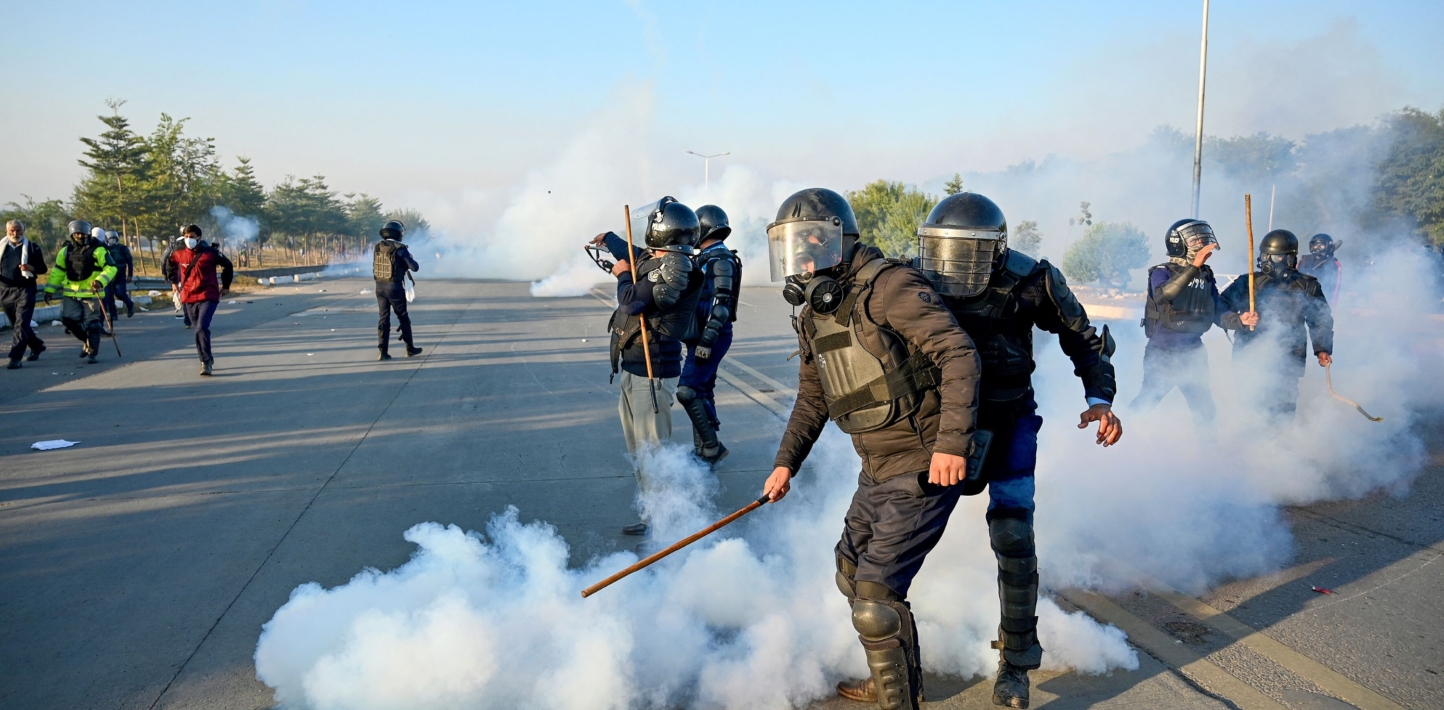- Annual report highlights the creep of authoritarian practices and vicious clampdowns on dissent around the world
- President Trump’s first 100 days intensify 2024’s global regressions and deep-rooted trends
- Global failures in addressing inequalities, climate collapse, and tech transformations imperil future generations
- The rise of authoritarian practices and annihilation of international law are not inevitable: people do and will resist attacks on human rights; governments can deliver international justice and must continue to do so
The Trump administration’s anti-rights campaign is turbocharging harmful trends already present, gutting international human rights protections and endangering billions across the planet, Amnesty International warned today upon launching its annual report, The State of the World’s Human Rights.
This “Trump effect” has compounded the damage done by other world leaders throughout 2024, eating away at decades of painstaking work to build up and advance universal human rights for all and accelerating humanity’s plunge into a brutal new era characterized by intermingling authoritarian practices and corporate greed, Amnesty International said in its assessment of the situation in 150 countries.
“Year after year, we have warned of the dangers of human rights backsliding. But events of the past 12 months – not least Israel’s livestreamed but unheeded genocide of Palestinians in Gaza – have laid bare just how hellish the world can be for so many when the most powerful states jettison international law and disregard multilateral institutions. At this historical juncture, when authoritarian laws and practices are multiplying the world over in the interests of very few, governments and civil society must work with urgency to lead humanity back to safer ground,” said Agnès Callamard, Amnesty International’s Secretary General.
Year after year, we have warned of the dangers of human rights backsliding. But events of the past 12 months – not least Israel’s livestreamed but unheeded genocide of Palestinians in Gaza – have laid bare just how hellish the world can be for so many when the
Agnès Callamard, Amnesty International’s Secretary General
most powerful states jettison international law
and disregard multilateral institutions.
The State of the World’s Human Rights documents vicious, widespread clampdowns on dissent, catastrophic escalations of armed conflict, inadequate efforts to address climate collapse, and a growing backlash globally against the rights of migrants, refugees, women, girls and LGBTI people. Each of these faces further deterioration in a turbulent 2025 unless a global about-turn is achieved.
“One hundred days into his second term, President Trump has shown only utter contempt for universal human rights. His government has swiftly and deliberately targeted vital US and international institutions and initiatives that were designed to make ours a safer and fairer world. His all-out assault on the very concepts of multilateralism, asylum, racial and gender justice, global health and life-saving climate action is exacerbating the significant damage those principles and institutions have already sustained and is further emboldening other anti-rights leaders and movements to join his onslaught,” Agnès Callamard added.
“But let us be clear: this sickness runs much deeper than the actions of President Trump. For years now, we’ve witnessed a creeping spread of authoritarian practices among states the world over, fostered by aspiring and elected leaders willingly acting as engines of destruction. As they drag us into a new age of turmoil and cruelty, all who believe in freedom and equality must steel ourselves to counter increasingly extreme attacks on international law and universal human rights.”
The proliferation of authoritarian laws, policies and practices targeting freedom of expression, association and peaceful assembly that Amnesty International documented in 2024 was central to the global backlash against human rights. Governments across the world sought to evade accountability, entrench their power and instil fear by banning media outlets, by disbanding or suspending NGOs and political parties, by imprisoning critics on baseless charges of “terrorism” or “extremism”, and by criminalizing human rights defenders, climate activists, Gaza solidarity protesters and other dissenters.
Security forces in several countries used mass arbitrary arrests, enforced disappearances and often excessive – sometimes lethal – force to suppress civil disobedience. Bangladeshi authorities issued “shoot-on-sight” orders against student protests, resulting in almost 1,000 deaths, while security forces in Mozambique unleashed the worst crackdown on protests in years following disputed elections, leaving at least 277 people dead.
Türkiye imposed blanket bans on protests and continues to use unlawful and indiscriminate force against peaceful demonstrators, but people power prevailed in South Korea when president Yoon Suk Yeol suspended certain human rights and declared martial law, only to be removed from office and see those measures overturned after massive public protests.
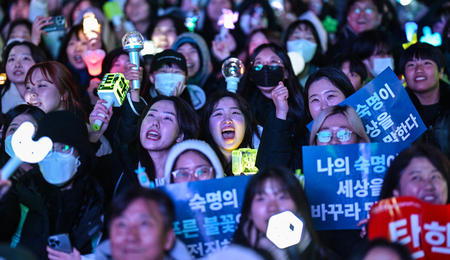
Armed conflicts highlight repeated failures
As conflicts multiplied or escalated, state forces and armed groups acted brazenly, committing war crimes and other serious violations of international humanitarian law that devastated the lives of millions.
Amnesty International documented Israel’s genocide against Palestinians in Gaza in a landmark report and its system of apartheid and unlawful occupation in the West Bank turned increasingly violent. Meanwhile, Russia killed more Ukrainian civilians in 2024 than it did the year before, continuing to target civilian infrastructure and subjecting detainees to torture and enforced disappearance.
Sudan’s Rapid Support Forces inflicted widespread sexual violence on women and girls, in what amounts to war crimes and possible crimes against humanity, while the number of people internally displaced by Sudan’s two-year civil war rose to 11 million – more than anywhere else on earth. Yet that conflict elicited near-total global indifference – aside from cynical actors exploiting opportunities to breach the Darfur arms embargo.
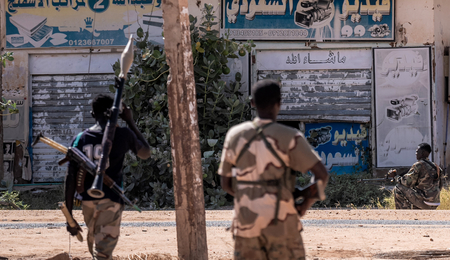
The Rohingya continued to face racist attacks in Myanmar, causing many to flee their homes in Rakhine state. The Trump administration’s massive foreign aid cuts have since aggravated the situation, causing the closure of hospitals in refugee camps in neighbouring Thailand, exposing fleeing human rights defenders to risk of deportation and imperilling programmes helping people survive the conflict.
The initial suspension of US foreign aid also impacted health services and support for children forcibly separated from their families at detention camps in Syria, and the abrupt cuts have shut down lifesaving programmes in Yemen, including malnutrition treatment for children, pregnant and breastfeeding mothers, safe shelters for survivors of gender-based violence, and healthcare for children suffering from cholera and other illnesses.
“Amnesty International has long warned of double standards undermining the rules-based order. The impact of that to-date unfettered backsliding plumbed new depths in 2024, from Gaza to the Democratic Republic of Congo. Having paved the way for this mess by failing to universally uphold the rule of law, the international community must now shoulder the responsibility,” said Agnès Callamard.
“The cost of these failures is gargantuan, namely the loss of vital protections built to safeguard humanity after the horrors of the Holocaust and World War Two. Despite its many imperfections, obliteration of the multilateral system is no answer. It must be strengthened and reimagined. Yet, having seen it sustain further damage in 2024, today the Trump administration appears intent on taking a chainsaw to the remnants of multilateral cooperation in order to reshape our world through a transactional doctrine steeped in greed, callous self-interest and dominance of the few.”
Governments are abandoning future generations
The State of the World’s Human Rights presents stark evidence that the world is condemning future generations to an ever-harsher existence thanks to collective failures to tackle the climate crisis, reverse ever-deepening inequalities and restrain corporate power.
COP29 was a catastrophe, with a record number of fossil fuel lobbyists inhibiting progress on a fair phase-out, while the wealthiest countries bullied lower-income nations into accepting derisory climate financing agreements. President Trump’s reckless decision to abandon the Paris Agreement and his “drill, baby drill” refrain have only compounded these failings and could encourage others to follow suit.
“2024 was the hottest year on record and the first to exceed 1.5°C above pre-industrial levels. The floods that devastated South Asia and Europe, the droughts that ravaged Southern Africa, the fires that razed swathes of Amazon rainforest and the hurricanes that wreaked havoc in the USA laid bare the immense human cost of global heating, even at its current levels. With a 3°C rise projected this century, richer nations know they’re not immune from increasingly extreme unnatural disasters – as the recent California wildfires drove home – but will they act?” said Agnès Callamard.
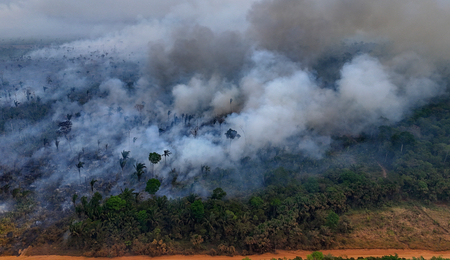
In 2024, extreme poverty and inequality within and between states continued to deepen due to widespread inflation, poor corporate regulation, pervasive tax abuse and rising national debts. Yet many governments and political movements used racist and xenophobic rhetoric to scapegoat migrants and refugees for crime and economic stagnation. Meanwhile, the number and wealth of billionaires grew, even as the World Bank warned of “a lost decade” in global poverty reduction.
The future looks far bleaker for many women, girls and LGBTI people, amid intensifying attacks on gender equality and identity. The Taliban imposed even-more-draconian restrictions on women’s public existence in Afghanistan, while Iranian authorities intensified their brutal crackdown on women and girls who defy compulsory veiling. Groups of women searching for missing loved ones in Mexico and Colombia faced all manner of threats and attacks.
Malawi, Mali and Uganda took steps to criminalize or uphold bans on same-sex relations between consenting adults, while Georgia and Bulgaria followed Russia’s lead in clamping down on supposed “LGBTI propaganda”. The Trump administration is bolstering the global backlash against gender justice by dismantling efforts to tackle discrimination, relentlessly attacking transgender rights, and ending funding for health, education and other programmes that supported women and girls all over the world.
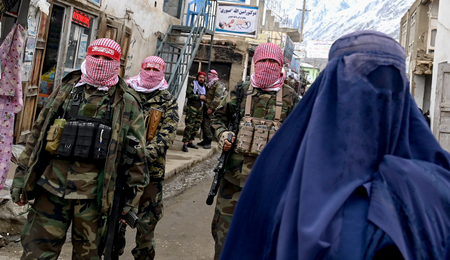
Governments are further harming present and future generations by failing to adequately regulate new technologies, abusing surveillance tools and entrenching discrimination and inequalities through increased use of artificial intelligence.
Tech firms have long facilitated discriminatory and authoritarian practices, but President Trump has exacerbated this trend, encouraging social media companies to roll back protections – including Meta’s removal of third-party fact-checking – and double down on a business model that enables the spread of hateful and violent content. The alignment between the Trump administration and tech billionaires also risks opening the door to an era of rampant corruption, disinformation, impunity and corporate capture of state power.
“From seating tech billionaires in prime position at his inauguration to granting the world’s richest man unprecedented access to the US government apparatus, it appears that President Trump will let his self-serving and corporate allies run amok, without the slightest regard for human rights or even the rule of law,” said Agnès Callamard.
Vital efforts to uphold international justice
Despite mounting opposition from powerful states – compounded this year by the Trump administration’s shameless sanctions against the ICC prosecutor – international justice and multilateral bodies have continued to push for accountability at the highest levels, with governments from the Global South leading several significant initiatives.
The ICC issued arrest warrants against senior state officials and leaders of armed groups in Israel, Gaza, Libya, Myanmar and Russia. The UN took an important step towards negotiating a much-needed treaty on crimes against humanity and the Philippines followed suit by arresting former president Rodrigo Duterte last month under an ICC warrant for the crime against humanity of murder.
The International Court of Justice (ICJ) issued three sets of provisional measure orders in the case South Africa brought against Israel under the Genocide Convention and issued an advisory opinion declaring that Israel’s occupation of Palestinian territory, including East Jerusalem, is unlawful. The UN General Assembly also passed a resolution calling on Israel to end its occupation, and in January 2025 eight states from the Global South formed the Hague Group, a collective committed to preventing arms transfers to Israel and holding it accountable for violations of international law.
“We applaud the efforts of nations like South Africa and international justice bodies to push back against powerful states hellbent on undermining international law. In so challenging impunity, those nations and bodies set examples for the whole world to follow. The mounting attacks we’ve witnessed on the ICC in recent months suggest this is emerging as a major battlefield of 2025. All governments must do everything in their power to support international justice, hold perpetrators accountable, and protect the ICC and its staff from sanctions,” said Agnès Callamard.
No matter who stands in our way, we must – and we will – continue to resist the reckless regimes of power and
Agnès Callamard
profit that seek to strip people of their human rights
“Despite daunting challenges, the destruction of human rights is far from inevitable. History abounds with examples of brave people overcoming authoritarian practices. In 2024 the people of several nations rejected anti-rights leaders at the ballot box while millions around the world raised their voices against injustice. So it’s clear: no matter who stands in our way, we must – and we will – continue to resist the reckless regimes of power and profit that seek to strip people of their human rights. Our vast, unshakeable movement will be forever united in our common belief in the inherent dignity and human rights of everyone on this planet.”
Download
- Amnesty International Report 2024/25
- Press Release
- एम्नेस्टी इन्टरनेसनल प्रतिवेदन २०२४/२५
- प्रेस विज्ञप्ति


